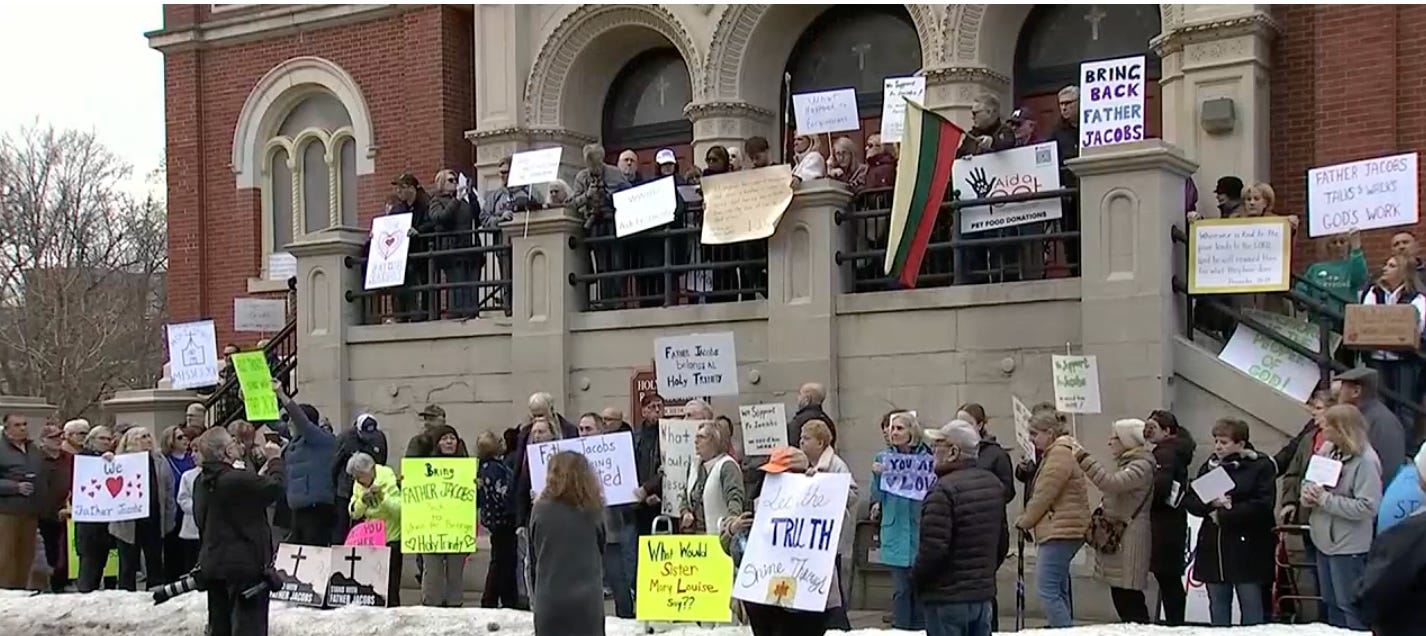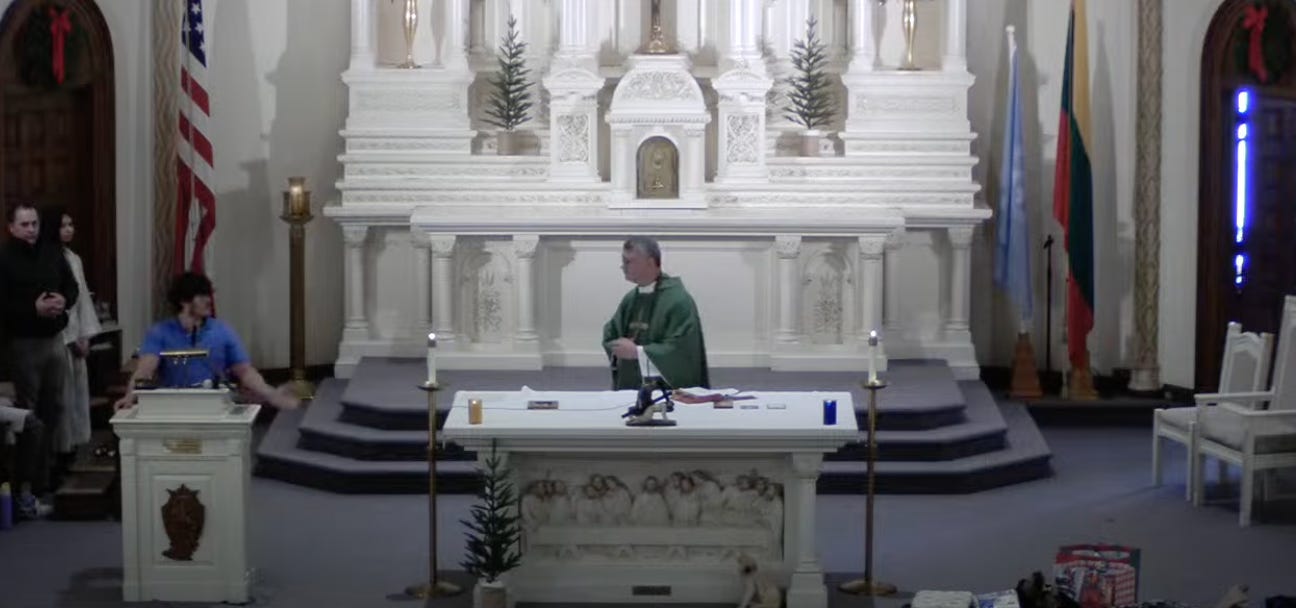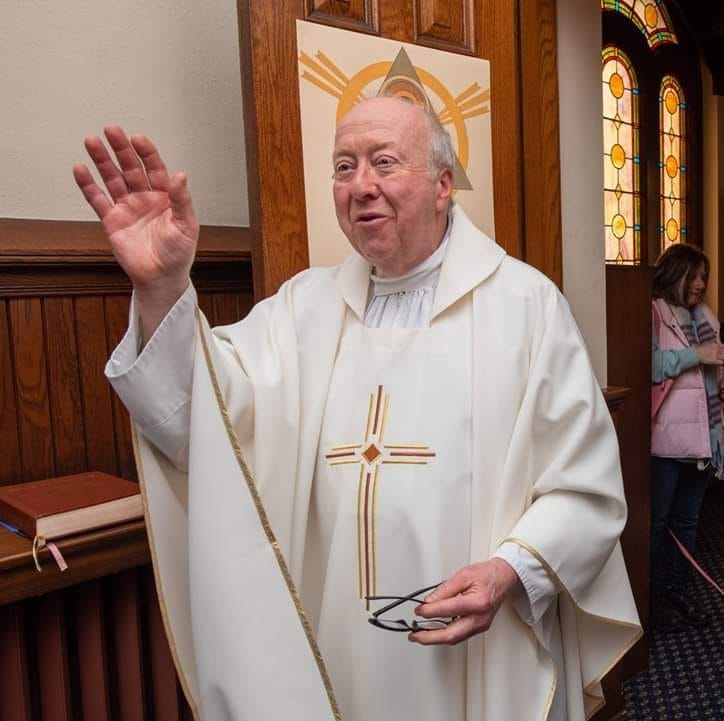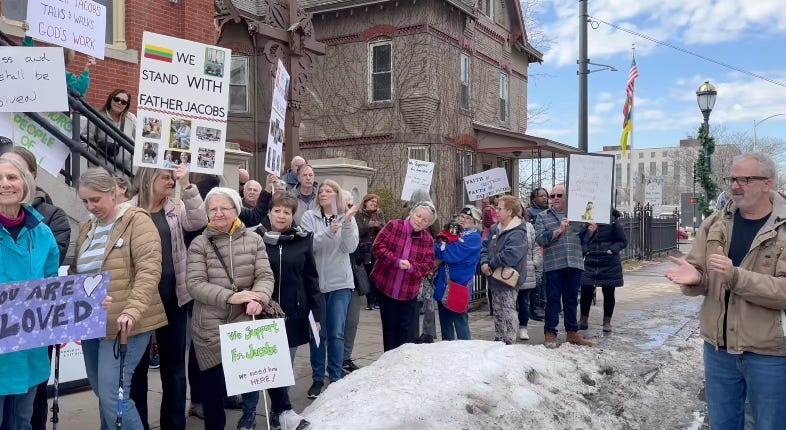
Connecticut Catholics protest priest theft investigation
While parishioners defend him, an archdiocesan spokesman says Fr. Charles Jacobs is not “a modern-day Robin Hood.”
Connecticut Catholics are protesting an archdiocesan investigation into a parish priest accused of stealing money from his Hartford parish.

A crowd of several dozen parishioners gathered outside Holy Trinity Church on Saturday, calling for Fr. Charles Jacobs to be reinstated to the church, after he was placed on administrative leave by the Hartford archdiocese amid an investigation of theft.
But while the priest claims he is innocent — and supporters in the parish have been outspoken in his defense — an expert in parish financial crimes warns that while parishioners are naturally sympathetic to their priests, they should suspend judgment until investigations are concluded.
Fr. Charles Jacobs, 73, has been assigned as administrator at Hartford’s inner city Holy Trinity Church for more than two decades, according to media reports. Holy Trinity is a mission of the nearby archdiocesan cathedral.
But at a January 26 Mass at the church, the archdiocesan vicar for clergy announced to parishioners that Jacobs had been accused of “possible financial improprieties,” and that Jacobs had admitted to taking “an undisclosed amount of money from the parish, for his unauthorized and personal uses.”
“As a result, Fr. Jacobs has been placed on administrative leave while the archdiocese conducts an investigation into its finances,” Fr. John Melnick told parishioners.
Calling the situation “shocking and disappointing,” Melnick said he wanted to emphasize the “seriousness of the allegations,” and urged that Catholics “allow the investigative process to take its course.”
Melnick said he could not provide details because the investigation was in its “early stages,” but said that eventually results would be shared with the parish.
As soon as Melnick announced the situation, a parishioner shouted from a pew that the allegations were “not true” — and the congregation responded with applause.

As the priest stood at the altar, a young parishioner took to the church’s ambo immediately after the announcement.
“We know [Jacobs]. We know him as people. Would Father Jacobs ever do that? No, he would not do that,” the young man said.
The congregation continued to applaud as the parishioner defended his priest.
“Look at the car [Jacobs] has,” the young man said. “Look at all the stuff he has. He doesn’t spend that money on himself. He doesn’t spend that money on himself. And if he was to, it would be to the poor.”
To more applause, he addressed Melnick: “That is what we’re supposed to do. We are supposed to donate to the poor. That is what we’re supposed to do and you know that.”
Parishioners applauded, and as Melnick aimed to conclude the Mass, the young man continued to speak.
“This is unfair. It is unfair. This guy … took away [Jacobs’] pension,” the young man said. “You know what these people are? They’re bullies. … and soon, they’re gonna shut this church down, and they’re not gonna say this to anybody, because they don’t want us to know.”
As he continued, parishioners applauded.
“Father Jacobs is the reason why half of us are even in here… he’s the reason why I even go to church. He’s the reason why I love church,” the young man said from the ambo, shortly before the livestream video of the Mass ended.
The Mass concluded without further incident, but the situation has remained controversial.
While the priest has reportedly admitted to taking money from the parish, he is at odds with diocesan officials about how much and for what purposes.
According to the Stamford Advocate, Jacobs has said he took small amounts of money from parish collections to help needy people, and that he “never took any Church money for my own personal use. I was giving it to people who came to our door before or after Mass.”
He told News 8 that archdiocesan officials “are saying that I was stealing the money. And I wasn’t stealing the money. I was taking the money from [the parish collection] to give to the people I encounter on a daily basis.”
The priest added that when Archbishop Christopher Coyne addressed the issue with him, the prelate was “angry, mean … He did not treat me like a Christian person.”
But archdiocesan spokesman David Elliot has called that claim “patently absurd,” telling the Stamford Advocate that Jacobs has fashioned himself “a modern-day Robin Hood.”
Elliot said that if Jacobs wanted to give parish money to the poor, he could have done so — but that instead, the priest took parish cash “for years,” and deposited it in his own bank account.
“There was no need for [Jacobs] to steal from the parish, take cash from the offertory or place the money in his personal bank account, and then ‘give it to the poor,’” Elliot said. “He simply could have just given the money from the parish to the poor."
It is not clear what exactly the priest is accused of doing with parish funds he reportedly deposited in his bank account.
But his attorney indicated that there could be suspicions related to gambling, telling the Stamford Advocate this month that archdiocesan officials claim to have filed complaints with police in Hartford and with the Mohegan Sun Tribal police, who oversee the Connecticut reservation on which a large casino is located — and Jacobs telling News 8 that Coyne implied he had spent parish funds on gambling.
While Jacobs’ lawyer argues that the archdiocese had not actually filed police reports, The Pillar has not yet been able to verify whether police in Connecticut are reviewing the matter.
For his part, the priest told reporters in Connecticut that while he regularly visits casinos, he does not gamble with church money.
And while he seems likely to face a canonical penal process, and the prospect of a criminal investigation, parishioners continue to rally for him.
Jacobs told News 8 that “from the very first moment that I met the archbishop for the first time, I could tell he had no use for me.”
The priest has been widely celebrated in the parish, for his ministry to the area’s homeless population, his pastoral presence among parishioners, and for his encouragement that Catholics regularly bring their pets to Mass.
Jacobs said that Coyne was “not happy to begin with” about the “pet-friendly” approach to liturgy at the church.
During the “Stand with Father Jacobs” rally on Saturday, one parishioner told attendees that for “the poor, the mentally ill, the elderly, [Jacobs] is the pastor for everybody who lives in this part of Hartford.”
“The Church better remember that this man does the Lord’s work for all the people here, and for them to punish him for doing that is itself a sin.”
Robert Warren, a retired IRS investigator and professor of accounting at Radford University, has conducted extensive research on priests who steal.
The researcher told The Pillar that his research found that “Connecticut has a disproportionate share of priest fraud cases,” with six of the 120 cases he studied — 5% of the total — taking place in the Nutmeg State.
While Holy Trinity itself is in a low-income part of Hartford, Warren noted other embezzlement and fraud cases in the state in which priests stole significant amounts of money from wealthier parishes.
“This is probably the result of several factors, but one primary reason may be the disproportionate amount of wealth in Connecticut. Priests in wealthy areas are as likely as anyone to want to ‘Keep Up with the Joneses,’” Warren said.
On the Jacobs case, Warren told The Pillar that he was unsurprised to see parishioners push back against the allegations of theft.
“Parishioners rallying behind a priest removed for alleged financial malfeasance is not uncommon,” he said.
“First, the parish priest is personally known to the parishioners. He is the one who baptizes their children, witnesses their marriages, forgives their sins, and makes the middle-of-the-night sick call to administer last rites to elderly relatives,” Warren pointed out.
“Second, the parish priest is the father to the parish, and no one wants to think that their father is a thief or, worse yet, that their father would steal from them.”
“Third, the bishop is more distant and may be viewed as an ‘ecclesial bureaucrat’ who sends out a Lenten appeal for money every year, but is not concerned about the parish,” Warren said.
But Warren cautioned both parishioners and archdiocesan officials to be cautious.
If it hasn’t already, “the archdiocese should make a police report and let law enforcement handle the matter,” he said.
“And the bishop should explain that he has an obligation to ensure that Church funds are used for the appropriate purpose. The bishop needs to emphasize that it is never appropriate for a priest to take parish money and put it in a non-parish bank account,” Warren said.
For their part, “parishioners should understand that Father Jacobs has not been tossed out on his ear. The archdiocese has an obligation to continue to provide him with a salary, along with appropriate housing and medical care.”
“Based on the news reports and Father Jacobs’ age, I suspect he will retire from active ministry and start collecting his pension and room and board …while law enforcement, the bishop, Father Jacobs’ attorney, and the diocesan insurance carrier work out a plea agreement and repayment plan acceptable to all parties involved,” Warren added.
Still, Warren also urged parishioners to suspend judgment until canonical and criminal investigations conclude.
“The parishioners should understand, however, that the bishop cannot return a priest to a position of financial responsibility if he does not know whether he will repeat his allegedly felonious behavior,” Warren pointed out.
“Just because Our Lord let Judas handle the money purse — even though Our Lord knew that Judas was stealing the donations — the bishop doesn’t need to do the same with parish pastors,” he pointed out.
“That is not a matter of forgiveness,” he said. “Instead, it is a matter of financial prudence.”
Neither Jacobs’ attorney nor the Hartford archdiocese has yet responded to The Pillar’s requests for comment.













The biggest problem here is the alleged crime. But what sticks out most to me is what the young man said from the ambo: “Father Jacobs is the reason why half of us are even in here… he’s the reason why I even go to church. He’s the reason why I love church…”
That’s a HUGE red flag to diocesan officials. When parishes become cults of personality, it becomes a lose-lose for the diocese, the next pastor, and the congregation.
A couple things from this article strike me. One is the young man’s insistence of the impossibility of his priest sinning. I think it reflects a cultural mode of thought regarding sin that is so abstract that it bears no connection to real life, and Sin gets bundled up and dumped into Bad People (and surely X is not a Bad Person! Bad People live over there, in the news, far away!)
The other is the later remark the young man made which seems to implicitly acknowledge the priest did take the money, but he did it for the right reasons. There’s a sentimental intentionalism there which will (rightly) be criticized at global Church levels but is also abstract and Over There. Imagine if a pope prevented a prosecution of a cardinal accused of various financial crimes! But this theft - little and did the right reason - that’s okay, it’s understandable, it was actually the right thing to do and we don’t want to get caught up in ideas like moral laws and Justice.
To be fair to the young man, I don’t know what it would be like to have someone who was an important support to my faith be accused of something. I imagine it would provoke an intense response of the passions.